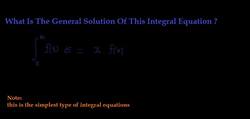This section requires Javascript.
You are seeing this because something didn't load right. We suggest you, (a) try
refreshing the page, (b) enabling javascript if it is disabled on your browser and,
finally, (c)
loading the
non-javascript version of this page
. We're sorry about the hassle.

first you have to differentiate both sides , the left hand side by fundamental theorem of calculus will be -f(x) and the right hand side by differentiation product rule will be f(x) + x f'(x). then, the equation become a simple differential equation ..you can solve the ODE simply by " Separation of variables method " and you'll get the answer is C/S^2 ..for Scientific integrity, if you pike another number instead of infinity you will get the same result f(s) = c/s^2 , but when you check for this solution in the original equation , you will get , it's WRONG ! , that is because in first step you got the rate of change in the both sides , so you simply solve to get just the rate of change , and if the rates of change of two functions are the same you cannot prove that the functions themselves are equivalent .... so you have to add an arbitrary constant